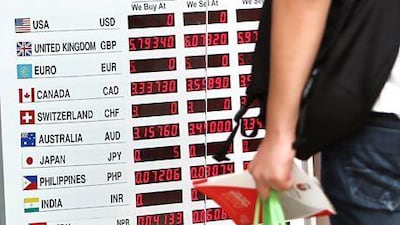The Central Bank has revoked the licences of two money exchange companies, claiming the pair broke regulatory rules.
Al Hilal Exchange and Asia Exchange Centre both committed "major regulatory violations", the regulator said in a statement yesterday. Al Hilal also breached anti-money laundering compliance rules, it said.
"Based on revocation of the licences, the two companies were prohibited from conducting any activities relating to remittances or currency exchange," the statement read.
"The Central Bank confirms that it will not tolerate violations of financial institutions to its regulations and instructions, and the Central Bank alerts not to deal with the above exchange companies."
The decision to revoke the licences was effective from yesterday, it added. Nobody was available from the Central Bank to comment further on the ruling.
Asia Exchange Centre had been at the centre of a row over non-payment of workers' wages and a failure to transfer expatriate remittances. The Sharjah-based Fortuna Engineering reported Asia Exchange Centre to the Central Bank and Dubai Police last year, saying the exchange house had failed to pay workers' wages deposited with it. Other customers facing similar non-payment of wages and remittances also complained.
Financial problems were possibly one of the sources of the breach of regulatory rules by both exchange houses, said Mohammed Al Ansari, the chairman of Al Ansari Exchange and former chairman of the Foreign Exchange & Remittance Group.
"We have more than 130 exchange houses in the UAE and over 750 outlets so the competition is tough and some cannot afford to run an exchange house as it's expensive," he said.
Under the Central Bank law of 1980, the regulator has the right to withdraw licences of financial companies not complying with federal laws.
As a conduit for commerce in the region, financial companies in the UAE have been under growing pressure to comply with a raft of tightening international sanctions and other anti-money laundering rules.
Last month, the US treasury blacklisted two Lebanese money exchange firms, alleging that they were laundering millions of dollars of funds for narcotics traffickers and providing financial benefits to the militant group Hizbollah. It was also alleged that one of the firms, Halawi Exchange, was wiring money indirectly to the United States via countries including the UAE, China and Singapore, which were perceived to receive less scrutiny by the US government.
Safeguards against money laundering have tightened globally in recent years as sanctions against countries such as Iran and Syria have been stepped up.
The UAE-based Noor Islamic Bank and international lenders such as HSBC and Standard Chartered have all been alleged to have fallen foul of international money laundering rules by US authorities.
In an effort to fight the risk of financing for terrorism and other criminal activity, the UAE in September 2011 set the limit on undeclared money that travellers are allowed to carry into or out of the country at Dh100,000.

